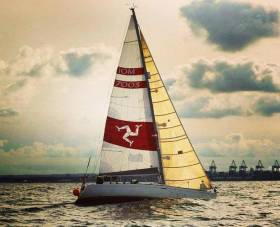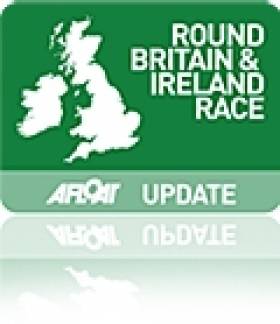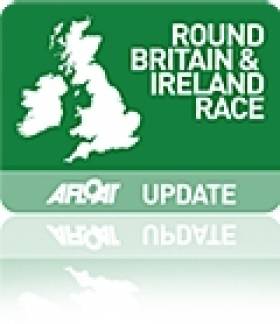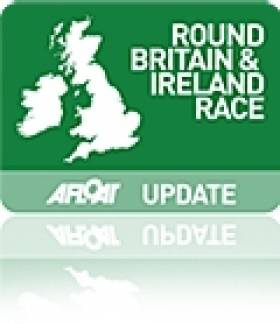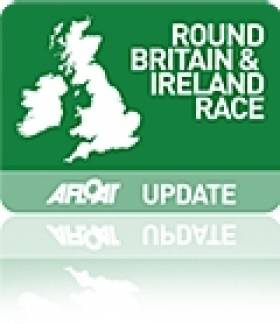Displaying items by tag: Lula Belle
A regular ISORA competitor will take on the marathon Round Britain and Ireland Race double handed class starting on Sunday 12th August, a feat that follows in the wake of Liam Coyne's National Yacht Club First 36.7 Lulu Belle that took double–handed honours in 2014. The Irish Sea racer Kuba Szymanski's Beneteau First 40.7, Polished Manx II is one of ten double handed entries for the race.
The 2018 Sevenstar sponsred race will feature a wide variety of yachts racing under the IRC rating rule as well as one design and open classes, such as IMOCA, Class40 and Multihulls. The majority of the fleet will race fully crewed, but with over 10 entries and expressions of interest for the IRC Two Handed Class, the race is expected to have a record entry for Two Handed challengers.
The first ever RORC Round Britain and Ireland race was held in 1976, but it was not until 2014 that a Two Handed Team successfully finished the race. In 2014, Liam Coyne's Irish First 36.7 Lulu Belle, racing with Brian Flahive won IRC Two Handed. Ian Hoddle's Rare was runner-up and the first team in the history of the race to complete the gruelling 1,800 nautical mile challenge. Hoddle will be back this year with a new boat, his Sun Fast 3600 Virgin Media Business, co-skippered by Ollie Wyatt.
"Our goal is to win the Sevenstar Round Britain and Ireland Race IRC Two Handed Class, and based on the close competition in the 2017 RORC season, the biggest challenge will be the intensity of an 1,800 mile match race over 9 to 12 days," commented Ian Hoddle. "We have learnt that a race is never won until the finish line is crossed. Hard won miles can disappear at any point and the complexity will push us to our physical and mental limits. The experience from the 2014 edition was fantastic; starting alongside some of the best boats and pro-crews on the planet, the RORC organisation, the media helicopters, and finally meeting my family after a tough race was very emotional."
Kuba Szymanski's Beneteau First 40.7 Polished Manx II will be flying the Polish flag in the Two Handed Class. The veteran skipper is a short-handed expert having completed the Round Ireland Yacht Race and the Rolex Fastnet Race on many occasions.
"Lulu Belle, the Two Handed winners in the last edition told us their epic story of the race and I know how good Liam Coyne and Brian Flahive are; they are our role models," says Szymanski. "To prepare for the race we will be racing and training as much as we can, maybe 10,000 miles. We will be confident of the boat and the crew, but the biggest challenge will be the weather."
Werner Landwehr's German Figaro II Dessert D'Alcyone will be racing Two Handed again having come third in 2014 and is one of the smallest boats competing. Richard Palmer's JPK 10.10 Jangada, class winner in the 2017 RORC Transatlantic Race is currently the smallest boat in the fleet and Ross Hobson's Pegasus Of Northumberland the largest. The British Open 50 took line honours for IRC Two Handed in the 2017 Rolex Fastnet Race.
'It's Amazing How That Sail Held' - Skipper Talks Lula Belle At Round Britain & Ireland Finish
#RORCSRBI - Liam Coyne and his sailing partner Brian Flahive crossed the finish line at Cowes around lunchtime today on their plucky First 36.7 Lula Belle to claim sixth place overall in this year's Round Britain and Ireland Race. Writing from the relative comfort of the shore, Coyne shared with us the pair's final days of racing...
Day 11 started with a night approach to Scilies. We had a great run with the A5 kite down but the wind went forward and we arrived with the jib up.
The worst part of having only one kite left was when to use it. When we rounded the Scilly Islands we should have put kite up and done three or four jibes but we had a spreader stuck through the mail sail and A lot of dark night gybing with it and our last kite did not appeal.
We ended up sailing around the Scillies to Lands End with only the main sail up. It was torture watching Rare pass us and have to be so conservative but we wanted to finish.
At first sunrise we hoisted the A5 and kept it going for 24 hours to arrive at the Isle of Wight at 6am on day 13. Despite Brian sowing it three times and the flogging it got in the last 24 hours, it's amazing how that sail held.
We were lucky to arrive at St Catherine's Point with tide so had a nice easy finish.
I must say I was very appreciative of the crew of Rare, who we beat to second, to come back out to the finish line with their families on board to applaud us over the finish.
The harbour master were good enough to tow us the the marina where the RORC team met us with media and champagne. It was confirmed we won the IRC Two-Handed class and combined classes 3 and 4, and finished sixth overall.
We are overwhelmed with all the well-wishes and messages. It's amazing how many were following [the race]. Boats are now tied up and we have to start repairs. Still have a 450-mile trip home.
Certainly it's one of the toughest races ever but very doable, and I hope our success this year leads a lot of other smaller boats to do this challenge.
#RORCSRBI - As of 10am BST this morning, Liam Coyne's Lula Belle was bearing down on the finish line just 8.4 nautical miles from Cowes at the end of a remarkable Round Britain and Ireland Race.
The First 36.7, skippered by Coyne and crewed by Brian Flahive, already has first place in the IRC Four and Two-Handed categories in the bag – topping Ian Hoddle's already-home Figaro II Rare for the latter after time correction – and is set to be confirmed as the sixth place finisher overall.
That would be the icing on an incredible achievement for the Irish pair, who survived days of fatigue and potentially race-ending gear failure to strive to the end.
As reported yesterday on Afloat.ie, German entry Varuna – owned by Jens Kellinghusen – was declared the overall winner under IRC of this year's Sevenstar Round Britain and Ireland Race.
#rorcsrbi – Dublin offshore two handers Liam Coyne and Brian Flahive are heading for the finish line of the Round Britain & Ireland Race on Saturday even though they have had a series of gear failures over the last 72 hours. Now – on day 10 – their engine, used to power batteries, will not start. Coyne sent this latest update to Afloat.ie this morning:
"When we thought there was nothing else left to fail the engine now will not start. This will probably be last mail from race. We are conserving all power to get us home. We are still not giving up and we have wind, a compass and charts so we can still finish. We now have 435 nm approx left and we feel we can safely cover that. We will inform you if there are any other developments"
Meanwhile, Swish, skippered by Canadian Roderick Knowles, crossed the finish line of the 2014 Sevenstar Round Britain and Ireland Race off the Royal Yacht Squadron, Cowes at 04.06.49 BST on Wednesday 20th August 2014 with an elapsed time of 8 days, 19 hours, 06 minutes and 49 seconds. Subject to ratification by the World Speed Sailing Record Council, this breaks the previous World Record for Monohulls 40 feet and less, set by Concise 2 in 2010, by over 18 hours.
This will be the fifth World Record broken during the 2014 Sevenstar Round Britain and Ireland Race organised by the Royal Ocean Racing Club.
Yesterday afternoon Custom JV52, Haspa Hamburg, finished the race to claim second in IRC Zero.
At 0900 BST on Day 10 JV53 Bank von Bremen, skippered by Carol Smolawa, is just 18 miles from the finish and is expected to be the 12th yacht to finish the Sevenstar Round Britain and Ireland Race and claim third place in IRC Zero. In IRC One Hanse 53, Saga, skippered by Peter Hopps, passed the Fastnet Rock in the early hours of Wednesday morning 390 miles from the finish.
In IRC Two there is a tremendous battle between J/122, Relentless on Jellyfish, skippered by James George, and J/111, British Soldier, skippered by Phil Caswell. Relentless on Jellyfish is sixteen miles behind the Army Sailing Association's British Soldier but leads on handicap by just 50 minutes.
The Irish Two-Handed team, Liam Coyne and Brian Flahive racing First 36.7, Lula Belle, spoke with the RORC Media Team as they approached the Irish Coast on Tuesday evening. "We are just off County Mayo, were I was born," said Liam Coyne. "All is well on board but we only have the A5 kite left, the other two are trashed and the mainsheet track has come away from the deck but it is nothing a bit of Irish engineering couldn't solve, I just hope it holds out. We are determined to finish this race but being so close to home makes us really want to get on with it."
The British Two-Handed team, Ian Hoddle and Conrad Manning racing Figaro II, Rare, have increased their lead over the German Figaro team, Dessert D'Alcyone, skippered by Werner Landwehr with crew Heiner Eilers. Rare is now 45 miles ahead, a gain of 25 miles over the last 24 hours.
Dublin Sailors Lead Round Britain & Ireland Race After Fantastic Run of 200 Miles in 24 Hours
#rorcsrbi – After more than a week at sea, Irish Two-Handed team, Liam Coyne and Brian Flahive racing First 36.7, Lula Belle, have had a fantastic 24 hour run, covering nearly 200 miles in the Round Britain and Ireland Race. Just 60 miles to go until Blackrock, the team will be welling up inside as they start to get a glimpse of the Irish coast during the day. Lula Belle is 620 miles (just under a full Round Ireland race distance) from the finish and their current estimated time of arrival in Cowes is midday on Saturday 23rd August. Lula Belle is currently leading the Two-Handed Class on the water and after time correction.
The British Two-Handed team, Ian Hoddle and Conrad Manning racing Figaro II, Rare, have covered 160 miles in the last 24 hours and have 700 miles to the finish. After Rare's pit-stop on the Isle of Lewis last night, the Two-Handed team have made a big gain. Werner Landwehr and Heiner Eilers racing two-up on their Figaro II, Dessert D'Alcyone, are just 19 miles behind Rare. This has created a fascinating battle at the back of the pack. Dessert D'Alcyone and Rare are both 32 feet in length and vying for the prize of the first 32 foot yacht to complete the race.
At 0800 this morning nine yachts were still racing. Ifan James, skipper of Stimpson 42 Palpatine, contacted the Royal Ocean Racing Club yesterday to retire from the race with all crew well. Palpatine left the Isle of Lewis in the early hours of Tuesday morning and is currently passing the Isle of Skye, east of the Outer Hebrides. A scenic sail past the stunning lochs of the West Coast of Scotland in good weather and dry clothes will be a dream compared to the rough conditions experienced over the last few days.
Roderick Knowles' Class40, Swish, rounded The Lizard just before dawn this morning. They are 150 miles from the finish and speeding along at over 8 knots, well inside world record pace for a yacht of 40ft or less. Swish is expected to finish the Sevenstar Round Britain and Ireland Race in the early hours of Wednesday morning (20th August).
Pride of Germany
Custom JV52, Haspa Hamburg skippered by Katrin Hilbert, is just 94 miles from the finish, 30 miles offshore south west of Portland Bill. The young crew are all members of the German yacht club, Hamburgischer Verein Seefahrt. Founded in 1903, the club's tradition is to encourage young people to take part in ocean racing. The vast majority of the crew is less than 25 years old. In 2010 the club's entry in the race, Norddeutsche Vermögen Hamburg, came 5th overall under IRC, taking just under 10 days to complete the course. For the 2014 race, Haspa Hamburg is currently 4th overall under IRC and should finish the race in under nine days.
BvB on board
Sent from on board Bank von Bremen to the race blog
Just 10 miles from the Scilly Isles with 237 miles to go, JV53 Bank von Bremen, skippered by Carol Smolawa, is crewed by members of the Segelkameradschaft das Wappen von Bremen (SKWB). Based in Bremen and founded in 1934, SKWB has about 700 members worldwide. It provides each member with the opportunity to use the club's own boats to race offshore and at national and international regattas.
Carol Smolawa sent in this message from the race course:
"After all the rough days, we have a wonderful sailing day and most important, we could dry our clothes! What a wonderful feeling to have dry boots and garments! Under gennaker we sail with 11 knots in sunny and warm conditions; who could not ask for more? Tomorrow morning we will see the Scilly Isles and then the final leg towards Cowes. We are all happy that we are competing in the Sevenstar Round Britain and Ireland Race. The boat and crew have no major incidences. Now we are giving it our best for the last leg to Cowes," writes Smolawa.
Jellyfish Goes West
J/122 Relentless on Jellyfish, skippered by James George, was positioned 30 miles off the west coast of Ireland last night, so far in the race only the Spanish Volvo Ocean 65, Team Campos, decided to go that far offshore. However, the move looks to be paying off. At St. Kilda, Relentless on Jellyfish was behind Hanse 53, Saga, skippered by Peter Hopps, and British Soldier, sailed by the Army Sailing Association. Relentless on Jellyfish seems to have benefited from more wind during the night and this morning has passed both Saga and British Soldier, moving into first position in IRC Two, just under two hours ahead of British Soldier.
Big ISORA Fleet Gathers for M2 Buoy Race
- Dinah
- Dublin Bay
- Just Enough
- Lula Belle
- ISORA
- National YC
- irish sea
- English Mick
- Quite Correct
- Galileo
- African Challenge
- Lancastrian
- Tsunami
- Rebellion
- Orna
- Madam Wen
- Rollercoaster
- Raging Bull
- Miss Scarlett
- Team Windmill
- First of September
- Finnigans Wake
- Windshift
- Mojito
- Adelie
- Gwawr
- Yahtzee
- Legally Blonde
- Katanca
- Oystercatcher
- Obsession
- Sarnia


























